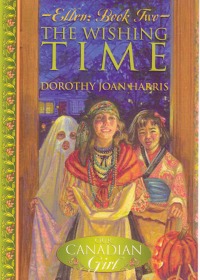| ________________
CM . . .
. Volume X Number 18 . . . . May 7, 2004
excerpt:
Ellen has more or less accepted the changes brought to her family by the Depression (see Ellen: Hobo Jungle) -- the loss of their house, the need to move in with grouchy Grandpa Sanders, having no money for extras like a ticket to the new colour movie, The Wizard of Oz. She wishes things would get better, and the onset of war in Europe seems to be the key. It brings a new, better paying job for her father, the ten cents she needs for a movie ticket, and a new friend, Marjorie, who recently escaped the Japanese invasion of China with her missionary parents. But Marjorie shuns Ellen's neighbour and friend, Amy Takashima, a Japanese Canadian, and Ellen begins to understand why the adults are so concerned about the war. This second story of Ellen and her family continues the short chapter style of the “Our Canadian Girl” series. The child-centred plot shows how confusing this period in history must have been for young people. The author has highlighted the disturbing events experienced by Canadians whose heritage made them targets of prejudice. In a tense scene, she offers a good lesson for young readers, for us all, with this innocent dialogue: Worthwhile classroom discussion might arise from this aspect of the story. Ellen has evolved from the first book into a livelier character, thinking resentful thoughts about Grandpa Sander's rules and regulations, and actively defending her friend Amy. She finds a way to bring her two friends together by sharing the results of her own improving fortunes -- her wish to see The Wizard of Oz comes true -- as they wait out the war, safe in Canada. Highly Recommended. Gillian Richardson, who lives in Sorrento, BC, is a former teacher-librarian and a published children's writer of fiction and nonfiction.
To comment
on this title or this review, send mail to cm@umanitoba.ca.
Copyright © the Manitoba Library Association. Reproduction for personal
use is permitted only if this copyright notice is maintained. Any
other reproduction is prohibited without permission.
NEXT REVIEW |
TABLE OF CONTENTS FOR THIS ISSUE
- May 7, 2004.
AUTHORS |
TITLES |
MEDIA REVIEWS |
PROFILES |
BACK ISSUES |
SEARCH |
CMARCHIVE |
HOME |
